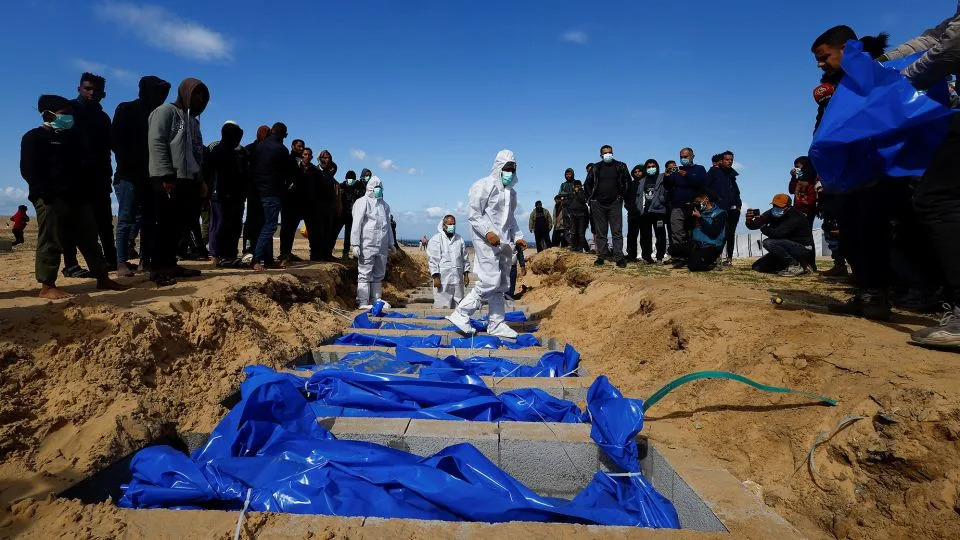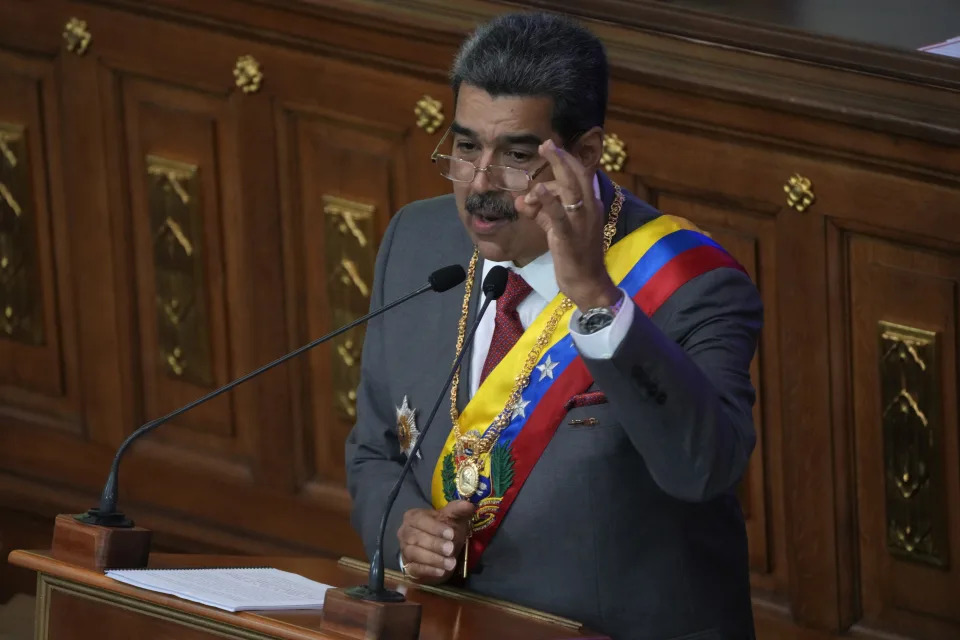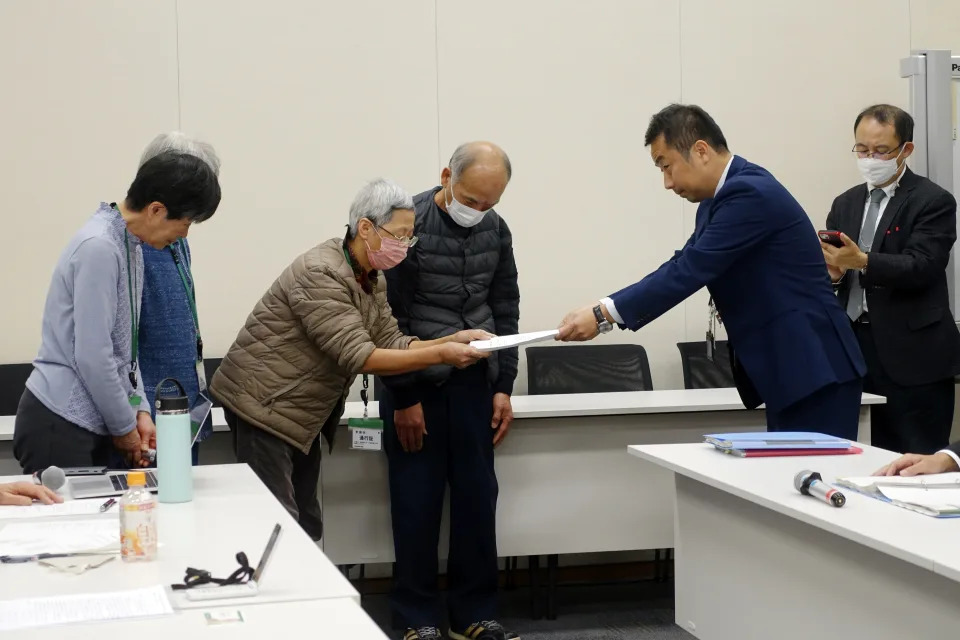Nik Popli
Fri, February 2, 2024

Israeli troops and tanks are stationed along the border with the Gaza Strip on February 2, 2024, as battles continue between Israel and the Palestinian Hamas movement.
More than 800 civil servants from the United States, the United Kingdom, and the European Union released a statement on Friday criticizing their governments' support of Israel in its war in Gaza, warning that such policies could be contributing to war crimes and violations of international law.
As Israel’s military continues its deadly offensive in Gaza, the officials emphasized that western governments risk being complicit in “one of the worst human catastrophes of this century” by failing to hold Israel to the same international humanitarian aid and human rights standards they apply to other countries. The officials say they privately expressed concerns about Israel’s military operations to leaders of their governments and institutions but have been ignored.
“Our governments’ current policies weaken their moral standing and undermine their ability to stand up for freedom, justice and human rights globally,” the statement says. “There is a plausible risk that our governments’ policies are contributing to grave violations of international humanitarian law, war crimes and even ethnic cleansing or genocide.”
Read More: The Stakes of the Lawsuit Alleging Biden is Complicit in Palestinian Genocide
The statement marks the first display of coordinated transatlantic dissent since Israel’s war against Hamas began nearly four months ago, when the Israeli military launched an air and ground operation in Gaza after Hamas fighters killed 1,300 people in southern Israel and took more than 240 hostage. More than 27,000 people in Gaza have been killed and nearly 2 million have been displaced since the war began, according to the health ministry in Gaza and the United Nations.
The signatories called on their governments to “stop asserting to the public that there is a strategic and defensible rationale behind the Israeli operation and that supporting it is in our countries’ interests.” They also urged western governments to halt military support and secure a ceasefire that will increase aid for Palestinians and ensure the release of Israeli hostages captured by Hamas.
Read More: For Antony Blinken, the War in Gaza Is a Test of U.S. Power
The statement says that it was coordinated by civil servants in European Union institutions, the Netherlands, and the U.S. and was endorsed by civil servants in Belgium, Denmark, Finland, France, Germany, Italy, Spain, Sweden, Switzerland, and the United Kingdom. The names of the civil servants are not listed, but the effort reveals that the current pro-Israel policies have generated dissent among some who work in government.
The statement comes a week after the International Court of Justice (ICJ)—the highest court of the United Nations—ordered Israel to do all it can to prevent death, destruction and any acts of genocide in Gaza caused by its military campaign. Israel has denied accusations of genocide in Gaza.
The signatories to the new letter demanded that Israel comply with the ICJ order. “Our governments have provided the Israeli military operation with public, diplomatic and military support,” the statement reads. The officials said they are concerned “that this support has been given without real conditions or accountability" as western governments "have failed to call for an immediate ceasefire and an end to blockages of necessary food/water/medicine in Gaza" in light of the war's death toll.
Write to Nik Popli at nik.popli@time.com.
Western officials in protest over Israel Gaza policy
Tom Bateman - BBC State Department correspondent
Fri, February 2, 2024

A destroyed building in Gaza
More than 800 serving officials in the US and Europe have signed a statement warning that their own governments' policies on the Israel-Gaza war could amount to "grave violations of international law".
The "transatlantic statement", a copy of which was passed to the BBC, says their administrations risk being complicit in "one of the worst human catastrophes of this century" but that their expert advice has been sidelined.
It is the latest sign of significant levels of dissent within the governments of some of Israel's key Western allies.
One signatory to the statement, a US government official with more than 25 years' national security experience, told the BBC of the "continued dismissal" of their concerns.
"The voices of those who understand the region and the dynamics were not listened to," said the official.
"What's really different here is we're not failing to prevent something, we're actively complicit. That is fundamentally different from any other situation I can recall," added the official, who spoke on condition of anonymity.
The statement is signed by civil servants from the US, the EU and 11 European countries including the UK, France and Germany.
It says Israel has shown "no boundaries" in its military operations in Gaza, "which has resulted in tens of thousands of preventable civilian deaths; and… the deliberate blocking of aid… putting thousands of civilians at risk of starvation and slow death."
"There is a plausible risk that our governments' policies are contributing to grave violations of international law, war crimes and even ethnic cleansing or genocide," it said.
The identities of those who signed or endorsed the statement have not been made public and the BBC has not seen a list of names, but understands that nearly half are officials who each have at least a decade of experience in government.
One retired US ambassador told the BBC that the coordination by dissenting civil servants in multiple governments was unprecedented.
"It's unique in my experience watching foreign policy in the last 40 years," said Robert Ford, a former American ambassador to Algeria and Syria.
He likened it to concerns within the US administration in 2003 over faulty intelligence leading up to the invasion of Iraq, but said this time many officials with reservations did not want to remain silent.
"[Then there were] people who knew better, who knew that intelligence was being cherry-picked, who knew that there wasn't a plan for the day after, but nobody said anything publicly. And that turned out to be a serious problem," he said.
"The problems with the Gaza war are so serious and the implications are so serious that they feel compelled to go public," he said.
The officials argue the current nature of their governments' military, political or diplomatic support for Israel "without real conditions or accountability" not only risks further Palestinian deaths, but also endangers the lives of hostages held by Hamas, as well as Israel's own security and regional stability.
"Israel's military operations have disregarded all important counterterrorism expertise gained since 9/11… the [military] operation has not contributed to Israel's goal of defeating Hamas and has instead strengthened the appeal of Hamas, Hezbollah and other negative actors".
The officials say they have expressed their professional concerns internally but have been "overruled by political and ideological considerations".
One senior British official who has endorsed the statement told the BBC of "growing disquiet" among civil servants.
The official referred to the fallout from last week's preliminary ruling by the UN's International Court of Justice in a case brought by South Africa which required Israel to do all it can to prevent acts of genocide.
"The dismissal of South Africa's case as 'unhelpful' by our Foreign Secretary puts [the international rules-based] order in peril."
"We have heard ministers dismiss allegations against the Israeli Government seemingly without having received proper and well-evidenced legal advice. Our current approach does not appear to be in the best interests of the UK, the region or the global order," said the official who also spoke on condition of anonymity.

An effigy of Joe Biden with a sign saying 'Genocide Joe' at a protest
In response to the statement, the UK Foreign Office said it wanted to see an end to the fighting in Gaza as soon as possible.
"As the Foreign Secretary says, Israel has committed to act within international humanitarian law and has the ability to do so, but we are also deeply concerned about the impact on the civilian population in Gaza," said a spokesperson.
The European Union Commission said it was "looking into" the statement. The US State Department has been approached for comment.
The statement suggests that while Israel's military operation has caused unprecedented destruction of lives and property in Gaza, there appears to be no workable strategy to effectively remove Hamas as a threat, nor for a political solution to ensure Israel's security in the longer term.
It calls for the US and European governments to "stop asserting to the public that there is a strategic and defensible rationale behind the Israeli operation".
Israeli officials have consistently rejected such criticism. In response to the new statement, the Israeli embassy in London said it was bound by international law.
It added: "Israel continues to act against a genocidal terrorist organisation which commits war crimes as well as crimes against humanity."
Prime Minister Benjamin Netanyahu has claimed that only full military pressure on Hamas will secure the further release of hostages, while the army says it has destroyed significant underground infrastructure used by the group, including command centres, weapons sites and facilities for holding hostages.
On Saturday, the Israeli military said: "Throughout [the city of] Khan Yunis, we have eliminated over 2,000 terrorists above and below ground."
Israel has repeatedly rejected claims it deliberately targets civilians, accusing Hamas of hiding in and around civilian infrastructure.
Since the start of the war, more than 26,750 Palestinians have been killed and at least 65,000 injured, according to health officials in the Gaza Strip, which has been governed by Hamas and blockaded by Israel and Egypt since 2007.
Israeli officials say that 9,000 of those killed were Hamas militants but have not provided evidence for the figure. More than 1,200 people were killed in Israel during the Hamas attacks of October 7th, and a further 100 died of their injuries according to Israeli officials. More than 250 people were taken as hostages into Gaza.
The US administration has repeatedly said that "far too many Palestinians have been killed" in Gaza, and that Israel has the right to ensure October 7th "can never happen again".
More than 800 Western officials sign scathing criticism of Gaza policy
Mick Krever, CNN
Fri, February 2, 2024
More than 800 officials from the United States and Europe have signed a scathing criticism of Western policy towards Israel and Gaza, accusing their governments of possible complicity in war crimes.
In a statement obtained by CNN, the officials say there is a “plausible risk that our governments’ policies are contributing to grave violations of international humanitarian law, war crimes and even ethnic cleansing or genocide.”
They accuse their governments of failing to hold Israel to the same standards they apply to other countries and weakening their own “moral standing” in the world.
Among them are around 80 United States officials and diplomats, a source told CNN.
In an unprecedented display of coordinated dissent since Israel’s war against Hamas began nearly four months ago, the signatories call on their governments to “use all leverage” to secure a ceasefire and to stop saying that there is a “a strategic and defensible rationale behind the Israeli operation.”
The public letter, released Friday, comes a week after the International Court of Justice (ICJ) found South Africa’s claim that Israel is committing genocide in Gaza to be “plausible,” and ordered Israel to “take all measures” to limit the death and destruction caused by its military campaign, prevent and punish incitement to genocide, and ensure access to humanitarian aid.
The statement “shows the depths of concerns and outrage and just horror that all of us are witnessing,” a US official with more than 25 years’ experience, who signed the letter, told CNN on Friday.
“The talking points that keep being delivered day after day are not cutting it.”
The US official told CNN that the signatories were motivated by their shared experience of having their concerns be ignored by their governments and by “the appropriateness” of public dissent by civil servants when ignored internally.
The official added that the ICJ’s decision to hear a genocide case lodged against Israel was validation for the authors’ concerns. Israel has strenuously denied accusations of genocide in Gaza.
“What was really important for those of us on the US side was to link arms with the people in Europe who believe their governments are following the US lead, and feel constrained by that,” the official said. “So we thought it was important that US officials continue to make clear their concerns with government policy on this.”

People bury Palestinians, including those killed in Israeli strikes and fire, at a mass grave in Rafah, January 30, 2024. - Mohammed Salem/Reuters
The statement, which does not list its signatories, says that it was “coordinated” by civil servants in European Union institutions, The Netherlands, and the United States, and endorsed by civil servants in Belgium, Denmark, Finland, France, Germany, Italy, Spain, Sweden, Switzerland, and the United Kingdom.
Despite the letter not listing its authors, the US official told CNN many colleagues feared losing their jobs, and that the lower number of US signatories reflected stronger protections for official dissents in Europe.
CNN has asked the U.S. State Department, the European Union, and the Dutch Foreign Ministry for a response to the statement. CNN has also reached out to the Israeli government for a response.
A senior British civil servant told CNN of the letter: “We feel that politicians have responded to the evolving situation, evinced by the Foreign Secretary’s words this week.”
The Dutch Foreign Ministry, in a statement to CNN, said that while civil servants are entitled to freedom of expression, they are subject to some limitations under Dutch law.
“It is only natural that the debate in society about the conflict between Israel and Hamas also exists within our ministry. We feel that there should be scope for this debate and we encourage staff to enter into dialogues internally. And these dialogues are taking place.”
‘We are obliged to do everything in our power’
In the letter, the officials say that they raised concerns internally within their governments and institutions, but their professional concerns have often been overruled “by political and ideological considerations.”
“We are obliged to do everything in our power on behalf of our countries and ourselves to not be complicit in one of the worst human catastrophes of this century,” they write.
Israel’s policies, they argue, are counterproductive to its own national security goals.
“Israel’s military operations have disregarded all important counterterrorism expertise gained since 9/11; and that the operation has not contributed to Israel’s goal of defeating Hamas and instead has strengthened the appeal of Hamas, Hezbollah and other negative actors.”
They say that Western support for Israel has come “without real conditions or accountability.”
“Our governments’ current policies weaken their moral standing and undermine their ability to stand up for freedom, justice, and human rights globally and weaken our efforts to rally international support for Ukraine and to counter malign actions by Russia, China and Iran,” they say.
Finally, they call on their governments to “develop a strategy for lasting peace that includes a secure Palestinian state and guarantees for Israel’s security, so that an attack like 7 October and an offensive on Gaza never happen again.”
CNN’s Luke McGee contributed reporting.
‘Overruled’: Over 800 U.S. And Allied Officials Issue Public Call For Shift In Gaza Policy
Akbar Shahid Ahmed
Updated Fri, February 2, 2024
Scroll back up to restore default view.
A group of more than 800 government officials in the U.S., Britain and major European countries ― as well as European Union institutions ― has signed a letter urging Western countries to reconsider their policy of near-total support for Israel’s devastating offensive in Gaza.
The letter, released Friday, urges those governments to use all possible leverage, including potentially cutting off military support for Israel, to secure a cease-fire in Gaza that will increase aid for Palestinians and bring the release of Israeli hostages captured by Hamas and other militants on Oct. 7. It’s the latest sign of deep alarm among foreign policy professionals about the path President Joe Biden and other world leaders have chosen since the attack and Israel’s retaliation began.
“We are expected as civil servants to respect, serve and uphold the law while implementing policies, regardless of the political parties in power… we have done so for our entire careers,” says the letter, also signed by people working for the French, German and Swiss governments, among others. “We have internally expressed our concerns that the policies of our governments/institutions do not serve our interests and called for alternatives that would better serve national and international security, democracy and freedom; reflect the core principles of western foreign policy; and incorporate lessons learned. Our professional concerns were overruled by political and ideological considerations.”
Frustration among national security experts inside the governments that Israel counts as its key international supporters is at an all-time high.
Earlier this week, Secretary of State Antony Blinken held a town hall-style meeting with State Department employees, a significant group of whom have signed so-called dissent cables challenging Biden’s Gaza policy. At the meeting, one staffer told Blinken that State Department employees are receiving messages daily from people in Gaza who have previously been involved in U.S. government programs and are asking what more the U.S. could do to end the conflict ― winning huge applause from attendees of the session, a State Department official told HuffPost.
State Department spokespeople did not respond to a HuffPost request for comment on the incident.
Josh Paul, a veteran State Department official whose resignation over the U.S. Gaza policy was first reported by HuffPost, helped organize the Friday letter, whose signatories are anonymous for fear of professional retaliation. In a statement regarding the message, Paul argued: “One-sided support for Israel’s atrocities in Gaza, and a blindness to Palestinian humanity, is both a moral failure, and, for the harm it does to Western interests around the globe, a policy failure.”
“This is a remarkable statement from hundreds of individuals who have devoted their lives to building a better world, and, at a time where our politicians seem to have forgotten them, it is a much-needed reminder of the core values that bind the transatlantic relationship, and a proof that they endure,” he continued.
The letter is expected to continue to attract signatures in the coming days.

Government workers in the Netherlands take part in a silent sit-in outside the Ministry of Foreign Affairs on Dec. 21 to show their dissatisfaction with the attitude of the outgoing cabinet toward Israeli's assault on Gaza.
The Netherlands, one of the wealthiest countries in Europe and the host of significant global institutions, such as the International Court of Justice (ICJ), has seen a significant uproar, with civil servants last month demonstrating outside the Foreign Ministry building.
“The Netherlands pretends to be the international rule-of-law and human-rights capital of the world, and look at us,” said Berber van der Woude, a former Dutch diplomat who was stationed in the occupied West Bank.
She argued that the message “shows that people who are experts, who have diplomatic experience… who have been serving the country for ages and have been doing that very loyally are so worried.”
“They would never choose to do this if it were not something very serious. It is a very exceptional situation, especially after the ICJ order,” said van der Woude, referring to the court’s ruling last week that there is a plausible risk of genocide in Gaza and that the Israeli offensive there must change course.
Angélique Eijpe, a 21-year veteran of the Dutch foreign ministry, resigned over her government’s approach in November. She said that signing the Friday letter was “an extraordinary thing for all involved to do.”
She told HuffPost that following the Oct. 7 attack, she tried to warn the foreign minister against Israel’s response, noting comments from Israeli ministers that demonstrated “genocidal intent.”
“I warned that I saw a parallel with our decision-making in the context of the Iraq War, where we also put all critical assessments of the situation aside because there was already a political decision made,” Eijpe said.
The government responded with “minimal expressions of concern for our well-being,” she said ― an echo of the listening sessions and town halls the Biden administration has offered to U.S. officials deeply disturbed by the moral and strategic implications of Washington’s choices.
“This type of concern is nice, but it also cast doubt on the professionalism of our concerns,” Eijpe said. American officials internally challenging the policy have cited national security arguments in doing so, and in November, HuffPost revealed that dozens of U.S. counterterrorism experts had privately written to the head of their agency saying Biden’s approach risked fueling blowback and undermining cooperation with other countries.
In her resignation note, Eijpe noted she is the breadwinner for her children and her decision to resign was difficult. But she compared it to the toll of the choices of her ancestors amid the Holocaust in the 1940s and Palestinians dying daily in Gaza today.
“Ultimately, I have the immense privilege of paying a relatively insignificant price to be on the right side of history,” Eijpe wrote.





